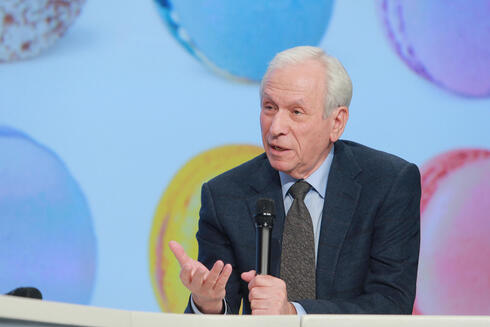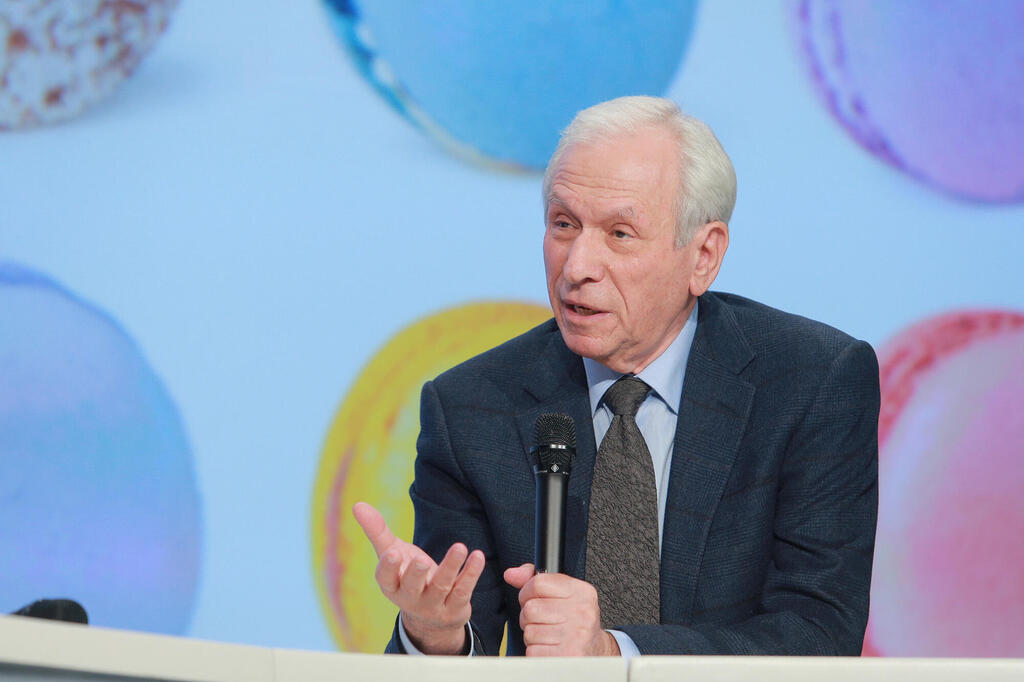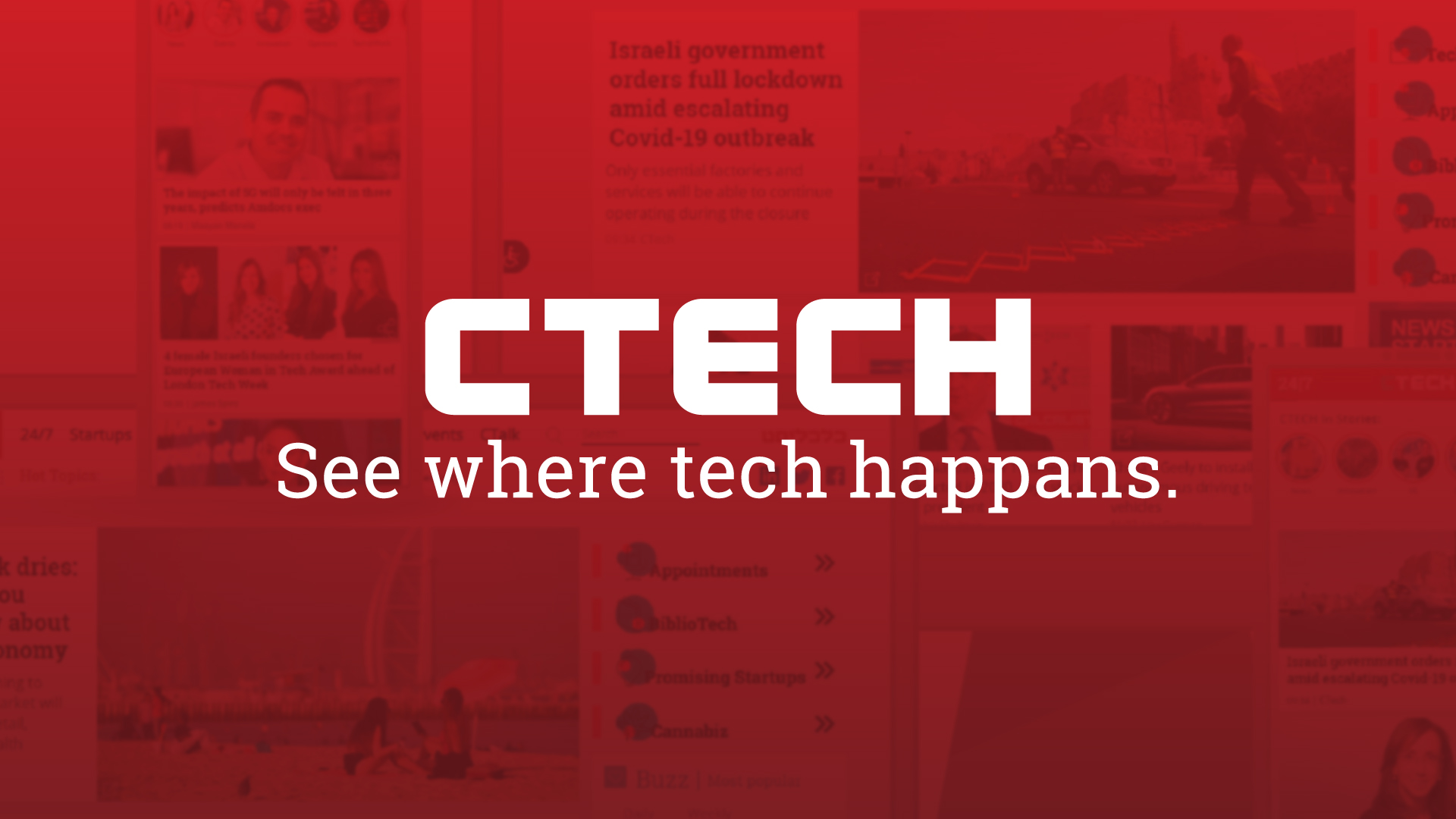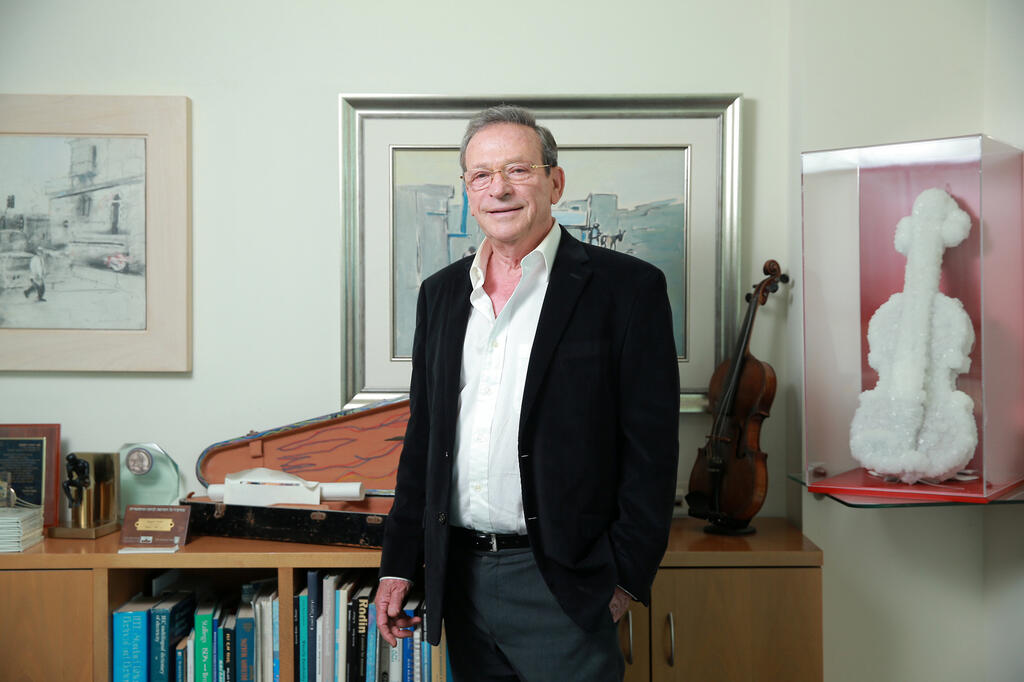
Interview
One of a kind: Israeli high-tech pioneer Zohar Zisapel's final interview
As one of the founding fathers of Israeli high-tech, and of the RAD Group, Zohar Zisapel helped birth more than 100 startups. Just a week before his passing from cancer, Zisapel sat down with Calcalist to share his many thoughts and wisdom in what would become his final interview
"You see I changed my hairstyle because of the chemo," Zohar Zisapel said at the beginning of the interview. "I don't look like that in your pictures in the press. I'm fighting the disease. There are good and encouraging signs, but we're at a draw in the war. The cancer didn't beat me and I didn't beat it. It’s 50-50. The odds were not on my side from the start. I should have been a goner a long time ago, but I didn’t give in. I don't recommend this disease.”
The veteran high-tech entrepreneur, one of the founding fathers of the local industry, battled cancer for a long period of time, and the interview had to be held on Zoom due to the mobility limitations caused by the treatments. The conversation with him was fluid, and Zisapel was as sharp-minded as ever, with one change: the full head of white hair he was known for had been replaced by baldness. He continued to radiate optimism and calmness, and insisted that the interview not deal with his illness. But the man who for 40 years knew where high-tech would go, who founded dozens of companies and invested in dozens of others, did not foresee the speed with which things would deteriorate in relation to his own health. Last week, a few days after the interview, he died at the age of 74.
Although Zisapel battled the disease on and off for over a decade, his death surprised even those closest to him. "I'm in tears. I still haven't digested it, as far as I'm concerned he's in the next room," Heli Bennun, a high-tech entrepreneur and his partner for the past 14 years, told me. "The disease was in the background of our life together the whole time. It first broke out six months after the beginning of our relationship. After two years it disappeared for seven years, then five years ago it came back, and in several cycles. Zohar fought like a giant. He was a man with a lot of strength, and continued to manage boards even when he suffered a terrible disability in his legs for three and a half years because of the treatments. He was a great man, who maintained total modesty."
"You can't avoid a bubble, and that is not bad"
"I'm not the father of high-tech," said Zisapel, rejecting the title we gave him at the very beginning of the conversation. "High-tech has dozens of fathers, from Gil Shwed to very young entrepreneurs, such as Assaf Rappaport from Wiz or Yevgeny Dibrov from Armis, both of whom I invested in. These are people who will do much more. This is the strength of high-tech here, that it was built by many people. It is a mosaic, not a legacy of founding fathers. The first companies were companies we founded, then people came out of them who founded their own companies, then their employees did it themselves and so on.
"The beauty of Israeli thinking is that people look at me and say: 'We know him, we were with him in the army, or in kindergarten, and he's not that smart - if he did it, we can do it too. Young people listen to me and think: 'Well, he doesn't really understand contemporary technology, he's a dinosaur. If he did it, we can probably do it too', and they succeed. So who does it belong to? To all of us. That's the beauty."
Still, Zisapel had a significant stake in the growth of the local high-tech industry. In the early eighties of the last century, he founded the RAD Group with his brother Yehuda, which focused on the early stages of the internet in the field of communication between computers. Today, more than 20 independent companies operate under the group, many of which have been issued and are traded on Nasdaq, and employ more than 4,500 people in Israel. Among the better known ones are RAD Data Communications, Radware, Radwin, RADCOM, Silicom Connectivity Solutions and Ceragon Networks. According to a study conducted in 2012 at Tel Aviv University, graduates of the RAD Group were responsible for the establishment of 111 substantial technological ventures - a number that naturally grew even more in the decade that has passed since then.
Zisapel was also one of the largest private investors in Israel, and invested in Wiz, Adallom, Talon Cyber Security, Argus, Innoviz and others. In recent years, he mainly focused on investments in the fields of autonomous vehicles, cybersecurity and medical research. He was also a philanthropist—he and his brother founded the RAD Foundation, which provided donations to promote technological education among youth from underprivileged populations and donates computer rooms to boarding schools, community centers, and youth centers. About a year ago, the two brothers received a lifetime achievement award from the Technion, for their "educational, social, and philanthropic activity…and for being one of the pillars of the Israeli startup nation."
This startup nation is currently facing a difficult crisis. After unimaginable records were broken in the two bubble years of 2020-21, when tens of billions of dollars flowed from venture capital funds to local startups and gave birth to unicorns with inflated values, the sector has come to a grinding halt. Money has stopped flowing in, valuations shrank, and many workers were laid off.
"There was an anomaly in the industry, but it's just a dynamic that always happens in high-tech," said Zisapel. "It starts innocently - a certain field is successful, it attracts more and more investors, including those who don't understand high-tech and invest recklessly, and then the field starts to swell. It happened now and it also happened in 2000, around the dot.com bubble. It’s very similar. You can say that the process is not healthy and complain about it, but in the end it is a natural process, because this is how a free market behaves, this is how people behave. This is human nature and this is the dynamics of things. I personally did not invest in such unicorns.
"In 1999-2000, the hype was in the field of communications, and today it is in the fields of enterprise startups and cybersecurity. Such a bubble has also started in artificial intelligence. In autotech, on the other hand, the hype has definitely calmed down. We have reached the stage of disillusionment that follows the bubbles, and indeed many companies are collapsing or are shrinking dramatically. For example, REE (most of its value disappeared after the IPO), or Autotalks (which intended to be issued at a value of $2 billion, and was sold this month for $400 million). We also saw this in fintech. You can't avoid a bubble. It's a natural process. And even after all the conclusions and all the analysis that will be written in the newspapers, in 10 years it will repeat itself. That's how a free market works, there is a clear herd phenomenon, and it's not terrible."
The problem lies not only in the crowd of investors, but also in an investment approach led by venture capital giants such as SoftBank: 'Grab market share at any cost, then we'll see how to reach profitability'. The result was companies that were valued in the billions without earning a single dollar.
"These funds, such as SoftBank, Tiger Global and Insight Partners, are right that there is an advantage to those who dominate a market. In most cases there really is one company that wins and achieves a great advantage. But what they forgot is that even very successful things have real value, and when they poured much more money than was necessary - they created this bubble and unreasonable valuations. Today, companies are crashing or downsizing and investors are disillusioned. Tiger Global, for example, is exiting the field of private investments, and it was clear to me that this would happen. But are SoftBank and Tiger Global fraudsters who let investors down? I believe that they believed in their own bullshit, that the field would continue to grow. The difference between a fraudster and a visionary is that a visionary believes in what they say. But distinguishing between the two is often very difficult."
This is a difficult call to make even with entrepreneurs. In the field of autotech, in which you are heavily invested, it has been promised for years that there will soon be autonomous vehicles on the roads. Have you been misled?
"The executives of the autonomous vehicle companies were dragged into making promises that are increasingly difficult to fulfill. Very serious people, including Elon Musk, Amnon Shashua, the CEO of Ford, the CEO of General Motors — they all did it. One said there would be a car in five years, the competitor said in two years, so if you wanted a headline in the newspaper, you had to say it would happen in a year. Personally, I entered the field knowing that it would not be fully realized in the coming years, but only in at least 15 years. Even today I say that. It was clear to me that this field has very difficult problems, which will take a long time to solve."
Do you think this will happen in your lifetime?
"Yes, but in stages."
And what will they be?
"First we will see autonomous vehicles in closed areas, where cars travel at a slow speed and on a fixed route. I have a startup called Carteav, which is developing exactly that - to drive people at a speed of 10 km/h inside a resort complex. This is a much simpler problem, because the speed is low and it is a closed area where there are no surprises, with an accurate map. But to develop a vehicle that travels anywhere in the world at any speed safely - this will not be solved in the next 15 years."
Are the empty unicorns of 2021 similar to those of the dot.com days?
"It was a bit different in the year 2000. You can't say that the companies were empty of content because they established communication infrastructures on the internet, but along the way a lot of money was lost. There were many communication companies that connected to the network and raised a lot of money, each one submitted a business plan that seemed reasonable, and each one told investors that all they needed to reach profitability was just a 10% share of the market. But there were already 1,000 such companies that needed 'only' 10%. It's still like that today. It is true in autotech and fintech, and it's still true in all kinds of software services for companies that are supposed to save them money. There is a limit to how much a company can save and how much it is worth investing for it."
What do you do to safely weather the bubble?
"I was careful in 1999-2000. I made sure that there was enough money in our companies, and in the end almost all of them made it through the crisis. Even in the current bubble, I made sure that there was enough money. In the days of high tide, we raised a lot, so that we would have full pockets for a rainy day. I didn't know when the moment would come, when the exact time would be that the air would be released from the balloon, but I estimated that it was getting closer because the indications were clear."
When will we experience a big bubble like 2021 again?
"In 10-20 years. We need enough time for the entrepreneurs and investors who created it to forget what happened, and especially for young people, who did not experience the bursting of the previous bubble firsthand, to enter the field."
"Despite the damage it caused, the government will not be able to kill high-tech"
Let's talk about the unique situation in Israel. All over the world high-tech is slowing down, but in Israel the judicial reform threatens to damage the international status of the local industry.
"I am not pleased with what is happening, but we are not on the brink of an abyss. High-tech will not disappear, and even the current government, despite the damage it has caused, will not be able to kill it."
Development centers are shrinking here and there are quite a few waves of layoffs.
"Many foreign companies, such as Google and Microsoft, have centers in Israel and compete for workers here, so I'm in favor of them only up to a certain limit. If their size here decreases a little it will not harm Israeli high-tech. That is why it bothers me less."
What does bother you?
"That new Israeli companies are registered in Delaware, and not in Israel. This is happening and it will cause damage for many years going forward. Today's young people are not what we were at their age: they are more international, more flexible, and have no problem living in America. That's why I'm afraid.
"I am the last person who would recommend to a company to register abroad. I was born here, I lived here, I have been in high-tech for 40 years, and I will die here, but I am not an example. Even in the nineties, when investors forced us to register companies abroad, I didn't do it. It took time for investors to gain confidence in Israeli companies and Israeli CEOs. Today I again see investors who will not invest in Israel. Of course they won't say that. They won't say 'we're not investing because of the legal reform', they'll just fade away."
Do you believe this is reversible?
"This is irreversible in the next year or two. Maybe its reversible over 20 years, because there was a loss of trust that took intellectual property out of Israel. This causes much greater damage than a foreign company reducing some activity in Israel."
What’s your position on the judicial reform?
"This is a very dangerous process. I think Bibi understands this, while the other politicians, who promote the reform, do not understand at all what damage they are causing. I am amazed by their stupidity and audacity to follow a certain route regardless of the destruction they cause. I have no way to stop this. They have already caused damage that will take 20 years to repair."
Who deserves the blame?
"The prime minister. He is the one who cooked up this stew. Israel needs a legal reform, but not like this. Changes should be made in the prosecutor's office and the police for the benefit of individual freedom and the benefit of the citizen, but this government is only interested in taking over the Supreme Court and making Israel a less democratic country. A compromise will improve the situation a lot, and the people also want it."
What will happen to Israeli high-tech if no compromise is reached?
"The companies here will not disappear in one day, but it will be more difficult for them to raise money and they will grow more slowly."
Why? Investors are willing to invest in China, for example, which is not democratic. And in Israel the authorities have not yet made company owners disappear.
"Would you like to live in China? It started with a GDP of about $300 per capita, so it had a lot of room to improve (its GDP stands at $12,800 per capita as of 2022). Today we are at $52,200, so we are not in the same situation. Despite all the problems of ultra-Orthodox and Arab employment, we managed to become one of the richest countries in the world, so we have a lot to lose."
Have you invested in Chinese companies?
"I didn't invest in China even when I had the chance, for exactly this reason: I didn't know what the government there would do and I didn't feel safe enough."
"We are the only ones left - we’re dinosaurs"
Zisapel has two children from his ex-wife: Klil Zisapel, an accomplished writer, and Dr. Michael Zisapel, an expert in internal medicine and rheumatology. Zohar Zisapel was born in Tel Aviv to Polish parents who owned a shoe store. "They came to Israel before the Holocaust, and the family that remained there was wiped out. My father immigrated to Israel because he was the youngest of 11 brothers and sisters. He was the last one that remained with his father. He would deliver milk, then go study in the ‘cheder’ as much as he could. And at the age of 13, when his father died, two of his sisters brought him to Israel and one of them raised him. He worked in his sister's shoe store, until he started a shoe store himself."
Zisapel began his career in the high-tech industry while in the IDF, when he served in Unit 81 and ultimately became its commander. After his release, he worked in the electronic research department at the Ministry of Defense in Tel Aviv, which he also later managed. He completed a bachelor's degree in electrical engineering at the Technion, and then a master's degree in business administration at Tel Aviv University - a path similar to that taken by his older brother Yehuda, who would become his business partner for the rest of his life.
"Yehuda and I are very close. We talk every day and have been business partners for many, many years, but we don't do everything together, although each one offers the other to participate in what he does. He didn't participate in most of my private investments."
How did two brothers from a family of shoe sellers come to lead the Israeli high-tech industry?
"The credit goes to my parents, who probably did something right. They weren't intellectuals, but it was very important to them that we study, because they didn't have the opportunity to study. And if there is a message for all Israelis who feel deprived, make sure your children study, and you won't have to talk about discrimination. This determines social progress, whether a child has studied or not.
"This is why we also donate to children who do not have the opportunity as education is the key. I also try to donate to the ultra-Orthodox, but it is difficult for those who have not studied math and English until they are 20. The ultra-Orthodox politicians will eventually be forced to agree to core studies, because no one can prevent the penetration of computers, smartphones and the internet, and it opens people up to the world. But I would like it to happen much faster, and not in the next generation."
Are you and your brother Yehuda similar to each other?
"We're very different in almost everything. We even look different. When we're next to each other, you don't see that we're brothers. And personally, Yehuda understands much more about marketing and sales, and I'm more on the technological side. We'd always argue. Over the years, I came to the conclusion that when we both agree on something, it's a very strong idea that we should go for. Armis, for example, is an amazing company, and it's not by chance that he joined me there."
How did your business partnership begin?
"In the early 1980s, Yehuda was marketing communications products of American companies in Israel, but he felt it was dangerous and did not want to do it alone. I had high-level development and technology knowledge, so we decided to establish something of our own, RAD, that would develop and produce the same products, but in Israel. There were no startups in Israel at the time and only a few large companies."
You founded a startup, when they didn't call it that yet.
"True. There were only a dozen more of these around us, like Comverse, which is no longer there. I think we are the only ones left since then. At the beginning, no one was willing to invest in us. We went to all the banks and insurance companies and they asked us where are the buildings or cars that could be pledged as collateral for investment. We said, 'There aren't any. It's all in the heads of the people'. So they rejected us. We were forced to grow slowly, step by step, with nothing."
"I don't like to invest where everyone else is investing"
What areas of investment attract you today?
"I'm still into autotech, even though others don't think like me. It's the biggest market in the world and we need technology for it, so I find it very interesting.”
Do you regret not investing in Mobileye?
"No, there are enough things that I invested in and I regret, so I don't have to regret what I didn't invest in."
What other areas are you interested in?
"I also invest in cyber, such as Ofer Ben-Noon’s Talon Cyber, and I also invested in two artificial intelligence companies (Hailo and Hi Auto) before everyone went in that direction, and I will continue to develop them. Today everyone is chasing artificial intelligence investments, it seems that this is the only sector that people are investing in, and there is a lot of competition there. I don't like to follow the herd. I shy away from it. Because if you go with the herd, then even if you succeed - you will have a small success. If you go against the flow and are right - those are the big successes."
Artificial intelligence has raised many concerns in the past year. Senior officials in the industry called for slowing down its development, fear the possible consequences. Are you more fascinated or worried?
"I see a technology that makes professions that require low-level writing redundant. ChatGPT will do it better than people, so it is a long and desirable process. It can also greatly help programmers to be much more effective and draft legal documents that require no creativity and are currently expensive. Some of these professions will be unnecessary, or people will work fewer days a week, this is efficient and not bad in my opinion."
Investing in the fields of biomed and pharma doesn't interest you?
"Many years ago we invested in many biotech companies, because the field of the genome fascinated me with its mathematics. But I got out of it, because it didn't suit me. It annoyed me that in this field the patient is of no interest to anyone. What is interesting is only that the doctor, the hospital, and the insurance company make a profit. It's also a field with a lot of regulation. I don't like it. I invested a lot in the field until recently, but I also don't feel I have an advantage there."
Are you optimistic about the future of the high-tech industry?
"The high-tech industry will continue to lead and even this harmful government will not be able to kill it. It will cause damage at certain points, but it will not kill it. And in 20 years there will be a new generation that will say 'what is ChatGPT, we have new things today'."
















